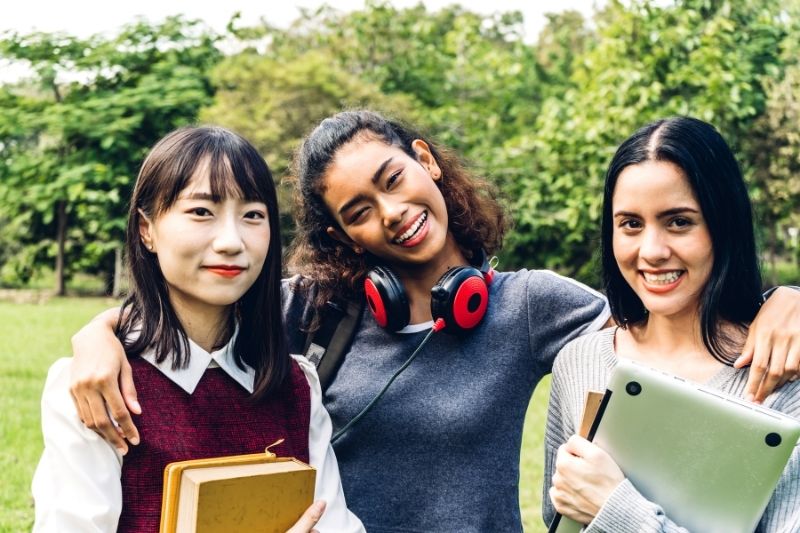Cross-Cultural or Comparative Studies
About
A strong theme in our work is exploring international, cross-cultural and cross-national perspectives of society and, more specifically, educational organisations and communities. Through a comparative study lens, we endeavour to better understand sociological, historical, cultural and institutional impacts on school change and development in an increasingly globalised world.
We collectively acknowledge the importance of diversity of perspective, relations, thinking and practice, and collaborate with domestic and international research colleagues to inform and guide our work. Our culturally rich differences, personal backgrounds and interests help us work across international borders. Through this, we continue to build a strong international community and networks of researchers, organisations and research that adds tangible domestic and international value, insight and impact.
Current Projects

Intercultural adaptation, communication and the development of intercultural understanding during short-term study abroad
This project examines and explores individual and collective preservice teachers' experiences and intercultural understanding and skills while living and working in the People’s Republic of China.
Find out more

Investigations into the effects of an internationalised curriculum and intercultural communication
This project examines comparative approaches to the internationalisation of the curriculum and the subsequent effects on students in order to better understand international and domestic students’ reactions to an internationalised approach to teaching and curriculum.
Find out more
Completed Projects
Publications
- Lee, M. (2022). Social Capital and Education. Wiley Blackwell Encyclopedia of Sociology (2nd Edition).Ritzer, G. & Rojek, C. (Eds.) UK: Wiley.
- Flesh, H.,* Lee, M., & Yemini, M. (2022). Between the flag and the globe: The national identity of Israeli students at United World Colleges and local schools. Educational Review. 74(1), 25-38.
- Kim, J., Park, H., & Lee, M. (2021). Effects of Ethnic Minority Adolescents’ Peer Networks on Academic Achievement The Case of Damunhwa Adolescents in South Korea. Social Psychology of Education. 21(3), 741-761.
- Choi, S.,* & Lee, M. (2021). Diversity as an opportunity or a challenge? A cross-national study of ethnic diversity and students’ generalized trust. International Journal of Educational Development, 80, 1-11.
- Maxwell, C., Yemini, M., Engel, L., & Lee, M. (2020). Cosmopolitan nationalism in the cases of South Korea, Israel and the U.S. British Journal of Sociology of Education, 41(6), 845-858.
- Valiente, O. & Lee, M. (2020). Exploring the OECD survey of adult skills (PIAAC): implications for comparative education research and policy, Compare: A Journal of Comparative and International Education, 50:2, 155-164.
- Lam, B., Byun, S. & Lee, M. (2019). Understanding educational inequality in Hong Kong: The perspective of secondary school segregation in changing institutional contexts. British Journal of Sociology of Education. 40(8), 1170-1187.
- Wright, E.* & Lee, M. (2019). Re/producing the Global Middle Class: International Baccalaureate Alumni at “World-Class” Universities in Hong Kong. Discourse: Studies in the Cultural Politics of Education. 40(5), 682-696.
- Lee, M. (2018). What American urban secondary schools could be: An international perspective. Journal of Educational Administration, 56(5), 463-472.
- Pak, S-Y. & Lee, M. (2018). ‘Hit the ground running’: Delineating the problems and potentials in state-led global citizenship education (GCE) through teacher practices in South Korea. British Journal of Educational Studies, 66(4), 515-535 [corresponding author].
- Cha, Y-K., Ham, S., & Lee, M. (2018). Routledge International Handbook of Multicultural Education Research in Asia Pacific. London, U.K.: Routledge.
- Lin, W., Lee, M., & Riordan, G. (2018). The role of teacher leadership in professional learning community (PLC) in International Baccalaureate (IB) schools: A social network approach. Peabody Journal of Education. 93(5), 534-550. [corresponding author].
- Cha, Y-K., Gundara, J., Ham, S., & Lee, M. (2017). (Eds.). Multicultural Education in Glocal Perspectives: Policy and Institutionalization. Singapore: Springer.
- Lee, M., Lam, B., & Madyun. N. (2017). Effects of different-race exposure in school and neighborhood on reading achievement of Hmong students in the U.S. Urban Education. 52(10), 1255-1283.
- Lee, M., Lam, B., Ju. E. & Dean, J. E.* (2017). Part-time employment and problem behaviors: Evidence from adolescents in South Korea. Journal of Research on Adolescence, 27, 88-104.
- Lee, M. (2017). Decoding the neoliberal subjectivity in self-helping adult learners. International Journal of Lifelong Education, 36(1&2), 145-163. [Reprinted in XXXX, Routledge].
- Barnett, G., Lee, M., Jiang, K., & Park. H.W. (2016). The flow of international students from a macroperspective: A network analysis. Compare, 46(4), 533-559. [co-first author].
- Yuen, C. & Lee, M. (2016). Mapping the life satisfaction of adolescents in Hong Kong secondary schools with high ethnic concentration. Youth and Society, 48(4), 539-556.
- Yuen, C., Lee, M., & Leung, S. (2016). Religious belief and its association with life satisfaction of adolescents in Hong Kong. Journal of Beliefs and Values, 37(1), 103-113.
- Lee, M., Madyun, N., Lam, B., & Jumale, M.* (2014). School contexts and acting White. Schools: Studies in Education, 11(1), 122-155.
- Lee, M. (2014). The role of ethnicity, class and gender in social capital formation: A case study of supportive peer networks among Somali working-class immigrant adolescents. In S. A. Jackson. (Ed.) Routledge International Handbook of Race, Class and Gender (pp. 147-160). New York, NY : Routledge.
- Lee, M. (2014). Bringing the best of two worlds together for social capital research in education: Social network analysis and symbolic interactionism. Educational Researcher, 43(9), 454-464.
- Lee, M., & Park, H.W. (2012). Exploring the web visibility of world-class universities. Scientometrics, 90, 201–218.
- Lee, M. & Friedrich, T. (2011). Citation network analysis of comparative education texts: A methodological consideration for micro social cartography. In J.C. Weidman & W. J. Jacob (eds.) Beyond the Comparative: Advancing Theory and Its Application to Practice (pp. 113-144). Rotterdam, Netherlands: Sense.
- Lee, M. & Friedrich, T. (2011). Continuously reaffirmed, subtly accommodated, obviously missing and fallaciously critiqued: Ideologies in UNESCO's lifelong learning policy. International Journal of Lifelong Education, 30(2), 151-169. [Best Paper, AERA Leadership for Social Justice Special Interest Group & Best Graduate Student Paper Award, Adult Education Research Conference]
- Lee. M. & Madyun. N. (2009). The impact of neighborhood disadvantage on the Black-White achievement gap. Journal of Education for Students Placed At Risk, 14(2),148-169.
- Lee, M., & Madyun, N (2008). School racial composition and academic achievement: The case of Hmong LEP students in the U.S. Educational Studies, 34(4), 319-331.
- Madyun, N., & Lee, M. (2008). Community influences on EBD student achievement. Education and Urban Society, 40(3), 307-328.
- Lee, M., & Madyun, N. (2008). Critical adult learning of Asian immigrant workers: A social network approach. Asia Pacific Education Review, 9(2). 113-126.
- Lee, M., Thayer, T.*, & Madyun, N. (2008). The evolution of the European Union’s lifelong learning policies: An institutional learning perspective. Comparative Education, 44(4), 445-464.
- Lee, M., & Friedrich, T.* (2007). The ‘smaller’ the school, the better?: The smaller learning communities program in U.S. high schools. Improving Schools, 10(3), 261-282.
- Wang, X., & Wang, T. (2021). Chinese teachers’ imaginaries: Comparing the pros and cons of Chinese education and other education systems. Compare: A Journal of International and Comparative Education, 51 (5), 725-744.
- Wang, X., & Wang, T. (2020). The mutability of pedagogical practice and space use: A case study of collaborative learning and classroom space in a Chinese primary school. Compare: A Journal of International and Comparative Education.
- Wang, T. (2020). Using photovoice as methodology, pedagogy and assessment tool in education: Graduate students’ experiences and reflections. Beijing International Review of Education, 2, 112-135.
- Tang, Y., Wang, T., Blythe Liu, L., & Li, Q. (2020). Teacher job satisfaction in high-performing systems: A multi-level study of teacher, classroom, and school factors using TALIS 2013 surveys. Asia Pacific Journal of Educational Research, 3(1), 17-43.
- Wang, X., & Wang, T. (2018). Discourse on nationalism in China’s traditional cultural education: Teachers’ perspectives. Educational Philosophy and Theory, 50(12), 1089-1100.
- Pang, N. S. K., & Wang, T. (2017). Investigating Chinese educational leaders’ Confucian ethics and value orientations in a transnational leadership program. Contemporary Educational Research Quarterly, 25 (1), 45-78.
- Wang, T. (2016). Intercultural dialogue framework for transnational teaching and learning. In Bista, K., & Foster, C. (eds.), Campus support services, programs, and policies for international students. (Chapter 12, pp.223-242). Hershey, PA: IGI Global.
- Huang, Z. J., Wang, T., & Li, X. J. (2016). The political dynamics of educational changes in China. Policy Futures in Education, 14 (1), 24–41. doi:10.1177/1478210315612644
- Huang, Z. J., & Wang, T. (2016). The occupational status and professional development of teachers in schools for migrant workers’ children in Shanghai. ECNU Review, 4,193-213.
- Wang, T., & Li, L. (2011). “Tell what to do” vs. “guide me through it”: Feedback experiences of international doctoral students. Active Learning in Higher Education, 12(2), 101-112.
- Wang, T., & Collard, J. (2009). Chinese leaders and Western discourses 2002-2004. In J. Collard and A. Normore (eds.) Leadership and intercultural dynamics. (pp. 233-258). Charlotte, North Carolina: Information Age Publishing.
- Wang, T. (2008). Intercultural dialogue and understanding: Implications for teachers. In M. Wallace and L. Dunn (eds.) Teaching in transnational higher education: Enhancing learning for offshore international students. (pp. 57-66). London: Routledge.
- Wang, T., & Li, L. (2008). Understanding international postgraduate research students’ challenges and pedagogical needs in thesis writing. International Journal of Pedagogies and Learning, 4(3), 88-96.
For further information on the Cross-Cultural or Comparative Studies program of research, please contact Prof Peter Bodycott and Prof Moosung Lee.




